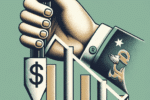New York, NY – Financial experts are warning that a surge in refinancing activity may pose a threat to the economy, potentially leading to a crash in the housing market. The recent wave of homeowners refinancing their mortgages at historically low interest rates has raised concerns about the stability of the housing sector and its broader impact on the overall economy.
The ongoing pandemic has created a favorable environment for homebuyers and homeowners looking to refinance, with mortgage rates hitting record lows. However, experts caution that a sudden influx of refinancing applications could destabilize the housing market, as lenders struggle to keep up with the high demand. This backlog in processing applications could lead to delays in closings, putting a strain on both buyers and sellers.
Furthermore, the spike in refinancing activity could have implications for the broader economy, as homeowners redirect funds toward paying off debts rather than engaging in consumer spending. This shift in priorities may dampen economic growth, as consumer spending is a key driver of economic activity.
While the benefits of refinancing are clear for individual homeowners, the broader implications for the economy remain a cause for concern. Financial experts are urging policymakers to closely monitor the situation and take appropriate measures to prevent a potential crash in the housing market. As interest rates continue to hover at historic lows, the risk of a housing market crash looms large.
In conclusion, while the current environment may appear favorable for homeowners seeking to refinance their mortgages, experts warn that a wave of refinancing activity could have negative consequences for the broader economy. It is essential for both homeowners and policymakers to exercise caution and monitor the situation closely to prevent any adverse effects on the housing market and the economy as a whole.










